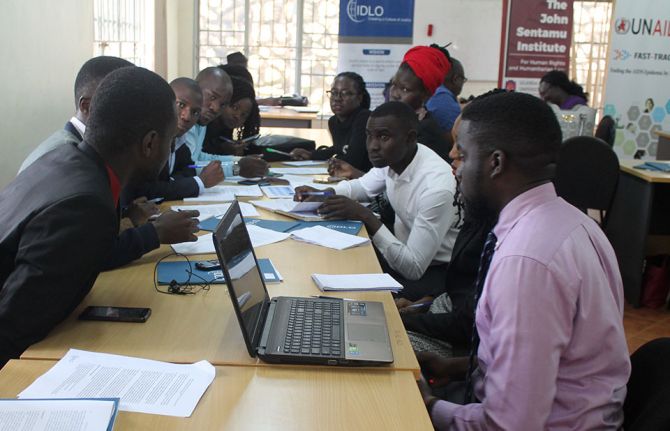

Feature Story
Partnership connects African law schools to the AIDS response
26 February 2018
26 February 2018 26 February 2018Stigma and discrimination, especially against women and girls and key populations, is a major barrier to people using HIV services. Up to 60% of countries report having laws, regulations or policies that deter people in key populations from being able to protect themselves from, or get treatment for, HIV.
There is therefore a need for legal services to challenge stigma and discrimination, but in many parts of the world such services are absent. Since teaching in law schools is often focused on core subjects, such as constitutional, administrative and criminal law, that often do not address legal issues related to HIV, most lawyers lack the specialized knowledge they need to take on HIV-related stigma and discrimination cases.
Academics sometimes need to give advice on key HIVrelated legal issues, such as the criminalization of HIV transmission. It is therefore important that they understand why human rights are essential to the response to HIV.
To respond to this lack of HIV-related legal knowledge, a unique pilot project has been set up with the law schools of the Universities of Dar es Salaam and Dodoma in the United Republic of Tanzania and Makerere University and Uganda Christian University in Uganda. The project will strengthen the legal environment for the response to HIV and give academics and students the skills they need to support human rights-based responses to HIV. It will also increase awareness in order to encourage communities to seek support from legal clinics.
“By training a committed and well-informed future generation of lawyers on HIV and the law and informing people about their rights, UNAIDS hopes to strengthen a human rights-based response to HIV in the United Republic of Tanzania and Uganda,” said Michel Sidibé, Executive Director of UNAIDS.
The project is the result of an agreement signed in 2014 by UNAIDS and the International Development Law Organization (IDLO) to scale up efforts towards zero HIV-related discrimination. The project is part of a collaboration that started in 2009 to strengthen and expand legal services for people living with HIV and key populations.
“HIV is not just a health issue, but a matter of social justice. It’s crucial that we equip the next generation of African lawyers with the knowledge and skills to effectively respond to HIV and end discrimination,” said Irene Khan, Director-General of IDLO.
The project will also see legal handbooks being developed for both the countries, which will serve as guidance on HIV and the law for students, lawyers and community leaders. The handbooks will consider HIV epidemiology in the region, the social and legal factors that contribute to HIV vulnerability, jurisprudence and common legal issues faced by people living with HIV and key populations. They will also give legal and non-legal options to address these issues.
“The project has exposed our students to new skills in responding to the challenges facing people living with HIV. The legal clinic now has the necessary skills to provide services to people living with HIV in Dodoma,” said Nicodemus S. Kusenha, a Lecturer at the University of Dodoma in the United Republic of Tanzania.
A UNAIDS, United Nations Development Programme and IDLO collaboration that started in 2009 has provided technical and financial support to HIV-related legal services in 18 countries and produced a publication on scaling up HIV-related legal services and elearning courses in four languages.
“Through an interaction with people living with HIV and key populations, we have been able to draw links between the theory of health law as we teach it and the beneficiaries of the law. This project has therefore made our teaching of the law more meaningful and with a human face,” said Zahara Nampewo, a Lecturer at Makerere University in Uganda.



